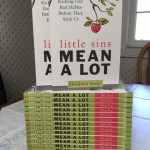Pondering the possibility of America being “remade” under the auspices of a Health Care Non-Vote–Deeming, I found myself thinking of St. Patrick, and the conflict between the English and the Irish; the Irish famine and the longview of God, which we cannot see or understand.
Many in America –a distinct majority, if polls are to be believed– are against the Health Care reforms we call “Obamacare” and they’re angry about the manner in which the Democrat-run Congress is trying to force them into law.
There is talk -and for some it is more than mere talk– of a revolutionary response, to the bill’s passing in its current state and by currently argued (or ignored) measures.
All of this is being perceived by many -on the left and the right, but most particularly on the right- as profoundly negative and worrying. “This cannot be allowed to happen” is what I see in my emails. “Americans will not stand for it,” is what I hear on my radio.
And yet, there is a very good chance that an arrogantly forced-through action making Obamacare the law of the land will happen. Because Americans are basically law-abiding, and because many of them are deplorably uninformed as to history or civics, the Democrats are counting on the American people to (after some initial hesitation and predictable noise) settle down and fall in line with an abundance of new laws. There is every reason to believe that largely-unaware and short-term memory challenged Americans (quickly, ask around you, who remembers the death of the Space Shuttle Columbia?) can be induced to plug in their iPods, download a few amusing apps to their iPhones, and more or less tune out a coup that is being dressed in the dreary robes of policywonk speak.
So for those Americans who are still wide-awake, whose consciences have not yet switched off and retired them into a monosyllabic haze, this is a very anxious, fretful time. People are distressed about the present, concerned about the future and wishful for a way to “go back” rather than forward.
Going back, however, is not an option and it will never happen; the thrust of narrative is always forward.
Then how do we deal with this present moment? How do we rein in our imaginations about the best and worst possibilities in our future, when all around us seems to be only but chaos, confusion and looming catastrophe.
This is where St. Patrick comes in.
The mind of God is unknowable; he works with a slow, centuries-spanning hand. But when we look back at history and events we can always see -if we really look- how sometimes terrible things had to happen, in order for that narrative thrust to be properly propelled.
St. Patrick was Romano-Britain -a Roman citizen of Britain- who was captured by Irish raiders and sold into slavery. After escaping and entering the church, he returned to Ireland as a bishop, and is universally credited with converting Eire to Christianity.
His slavery was a terrible thing that was allowed to happen; it drove him back to Ireland for a larger purpose. Read Thomas Cahill’s How the Irish Saved Civilization to understand how the inarguable negative of Patrick’s capture and enslavement became the impetus for an absolute good.
Patrick’s Catholic Ireland eventually suffered much, of course, at the hands of Protestant Britain; the penal codes the British used to subjugate and disempower the Irish Catholic majority was a horrendous bit of legislation, brutally enforced. It kept the Irish ignorant, unschooled, unpropertied, and dependent upon the potato as its basic food supply. When the potato crop suffered a blight, over a million people died of starvation; several million more immigrated, mostly to North America. Their broad backs and their adrenaline-junkie temperaments helped build and safeguard our cities, and today nearly 40 millions Americans can trace some part of their heritage to Ireland. The Irish then, share abundantly, in the story of America’s success and prosperity.
So, the British oppression of Ireland was a bad thing that was allowed to happen; another inarguable negative that laid the framework for an eventual “good”.
I’ve written many times before that sometimes a bad thing must happen, before eventual good things can take place. You have to look for it.
Unfortunately, the “positives” often do not show themselves for lifetimes and generations. Patrick’s mother could not imagine that her son’s enslavement would eventually result in the rescue of the history, art, philosophy and literature of an entire civilization, that his converting the Irish would strengthen them to endure catastrophe, and then launch themselves into the world as the burly shoulders of civil, military and community leadership. The “Apostle of Ireland” could could not have imagined it, himself.
For that matter, the apostles who laid low in an upper room after the crucifixion of their master could not have imagined that 2000 years later, Christianity would be the world-force it is, for better and for worse, and still evolving, still learning, still building within the mystery.
God’s hand moves slowly; his mind is unknowable, but we have been told there is a plan. “I know the plans I have for you, says the Lord; plans of fullness, not of harm, to give you a future and a hope.”
Throughout scripture we read “do not be afraid.” We read “only believe.” We read that “faith the size of a mustard seed” is enough to move mountains.
We read “fear is useless; what is needed is trust.”
That does not mean that when we see injustice we do nothing. It does not mean that if we see our government tumbling, we sit back and let it tumble.
But it does mean that we look at what happens around us with a Godly eye -with a genuine and faith-filled trust toward that longview that we cannot see, but which is full of God’s creative intention.
God is all-good. His intention can be nothing else but good.
While we’re fretting, while we’re activating, while we’re gathering, we should also consider that every “good” has its opposite, and so does every “bad.” American notions of liberty has been “the last best hope” for much of the world, but it has also made us self-indulgent, sometimes to excess. American prosperity has bettered the lives of hundreds of millions; it has also fed the human instinct to greed. In the eyes of God, well, all have sinned; none are perfect save Christ, and who knows what His justice is, compared to our understanding?
All of that is worth pondering, and praying about, as we watch what is taking place in our country today. Since we are in the middle of a picture, we cannot see the totality of it; we have a notion of how the picture began and how it might end, but we do not really know; our most outlandish imaginings cannot tell us.
But we do have a clue. Patrick’s enslavement took place in the 4th century; that not-especially unique event in the life of one man has had effect into the 21st. Everything that happens, for good or for evil, reverberates through the centuries, all of it the means of serving not our own finite ends, but God’s eternal ends.
In which case, I am sorry to seem simplistic, but “do not be afraid.” And, “fear is useless; what is needed is trust.”
I think I’ll file this under “Crucible of Faith.”
Related:
If the whole world were to crumble…
Apostle of the Isle and the States












